Amazon’s editors have chosen their top 20 picks for 2017–so far. The following descriptions are Amazon editors’ reviews of the books. Learn more about their choices in the shop: Best Books of 2017 –Amazon Collection
Their # 1 choice?
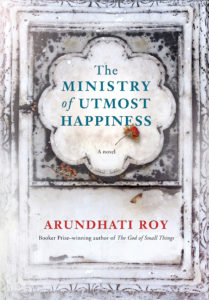 The Ministry of Utmost Happiness
The Ministry of Utmost Happiness
by Arundhati Roy
To read The Ministry of Utmost Happiness is to immerse yourself in years of India’s religious, political, and cultural changes and to feel it all through the narrative of an incredible cast of characters. What becomes apparent throughout their individual stories is that power and belief are malleable, that suffering does not end but merely changes hands, and what is revered can easily become reviled. The latter shows up most clearly for Anjum, formerly Aftab, who becomes a famous Hijra in Delhi, only to later find herself keeper of a graveyard sanctum for others who are no longer welcome in the new society. Yes, there is a lot of violence and heartbreak in this novel, but Roy also suffuses it with humor, irony, and –more than anything– the ability of love and acceptance to heal the broken. Even when, or perhaps, especially when, it comes from places one would never expect. The Ministry of Utmost Happiness is complex and compassionate, and the heart and soul that Arundhati Roy so obviously gave to it is worth every one of the many years it’s taken to give us another fictional masterpiece. –Seira Wilson, The Amazon Book Review
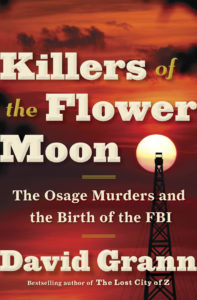 Killers of the Flower Moon: The Osage Murders and the Birth of the FBI
Killers of the Flower Moon: The Osage Murders and the Birth of the FBI
By David Grann
In the 1920s, the Osage found themselves in a unique position among Native Americans tribes. As other tribal lands were parceled out in an effort by the government to encourage dissolution and assimilation of both lands and culture, the Osage negotiated to maintain the mineral rights for their corner of Oklahoma, creating a kind of “underground reservation.” It proved a savvy move; soon countless oil rigs punctured the dusty landscape, making the Osage very rich. And that’s when they started dying.
You’d think the Osage Indian Reservation murders would have been a bigger story, one as familiar as the Lindbergh kidnapping or Bonnie and Clyde. It has everything, but at scale: Execution-style shootings, poisonings, and exploding houses drove the body count to over two dozen, while private eyes and undercover operatives scoured the territory for clues. Even as legendary and infamous oil barons vied for the most lucrative leases, J. Edgar Hoover’s investigation – which he would leverage to enhance both the prestige and power of his fledgling FBI – began to overtake even the town’s most respected leaders.
Exhuming the massive amount of detail is no mean feat, and it’s even harder to make it entertaining. But journalist David Grann knows what he’s doing. With the same obsessive attention to fact – in service to storytelling – as The Lost City of Z, Killers of the Flower Moon reads like narrative-nonfiction as written by James M. Cain (there are, after all, insurance policies involved): smart, taut, and pacey. Most sobering, though, is how the tale is at once unsurprising and unbelievable, full of the arrogance, audacity, and inhumanity that continues to reverberate through today’s headlines. –Jon Foro, The Amazon Book Review
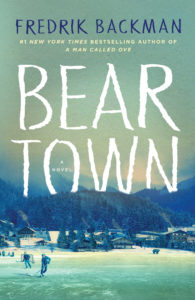 Beartown
Beartown
by Fredrik Backman
An Amazon Best Book of April 2017: How do I love Beartown? Let me count the ways. It’s a domestic drama in which a family is pulled apart by an act of violence. It’s a coming-of-age story for a young woman who must choose to speak out or keep silent. (And a young man, too, actually.) It’s a slow-build thriller, opening the story with the statement that one teenager is going to put a shotgun to the head of another and pull the trigger. It’s a cautionary tale of small-town thinking…yet at the same time celebrates how a handful of people can change a tight-knit community. Beartown has so much going on within its enjoyably readable pages that putting it in a literary box is all but impossible—and indeed that is one of the many reasons readers will pass this book amongst one another with a confident “I think you’ll like this.” As the town’s finances decline, small, scrappy Beartown hunkers deeper into itself, proud only of its white-hot junior hockey team led by a coach whose hard-driving mantra is, simply, “Win.” Seizing the upcoming hockey championship could lure a new hockey academy their way and jumpstart the local economy. But the exposure of a hidden crime sweeps the hockey club into its vortex and fractures the town and longtime friendships, even as it welds together new, unlikely alliances. Once the crime is revealed, Beartown could have strolled down an easy trail, but Backman refuses to tread it, sidestepping the predictable as he forges a new path of soul-searching and truth-telling. There are hard moments here, and readers might find difficult discoveries in their own hearts as the people of Beartown struggle with what they hope is real but fear is not. Masterful in its storytelling and honesty, this is another winner for Backman, surpassing even his much-lauded A Man Called Ove. —Adrian Liang, The Amazon Book Review
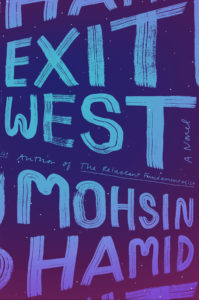 Exit West
Exit West
Moshin Hamid
An Amazon Best Book of March 2017: When Nadia and Saeed fall in love in a distant unnamed city, they are just like any other young couple. But soon bullets begin to fly, fighter jets streak the sky, and curfews fall. As the spell of violence spreads, they flee their country, leaving behind their loved ones. Early in Exit West, the author Mohsin Hamid explains that geography is destiny, and in the case of his two young lovers, geography dictates that they must leave. Hamid offers up a fantastical device to deliver his refugees to places: they pass through magic doors. Rather than unmooring the story from reality, this device, as well as a few other fantastical touches, makes the book more poignant and focused, pointing our attention to the emotions of exile rather than the mechanics. Surrounded by other refugees, Nadia and Saeed try to establish their places in the world, putting up different responses to their circumstances. The result is a novel that is personal, not pedantic, an intimate human story about an experience shared by countless people of the world, one that most Americans just witness on television. —Chris Schluep , The Amazon Book Review
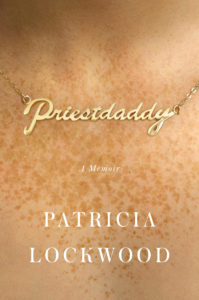 Priestdaddy
Priestdaddy
by Patricia Lockwood
An Amazon Best Book of May 2017: Do not be put off by the slightly creepy title of this memoir: this is no sordid tell-all outing a deviant priest. Priestdaddy slides into the “you can never go back” end of the memoir spectrum. When debilitating illness, and the poverty that results, drives poet Patricia Lockwood and her husband to accept her father’s offer of shelter, she reluctantly returns to her childhood home. Except in Patricia Lockwood’s case, her father is Father Greg Lockwood, a married priest (short explanation: papal dispensation) who likes to lounge about in his boxers, “shredding” his guitar, and raging “HOMEY DON’T PLAY THAT” to signify displeasure. Home for Patricia and her husband will be in a bedroom near that of her parents in the rectory which comes with her father’s parish (a sign outside reads ‘God answers kneemail’). Part of the fun in this hilarious memoir is watching Lockwood gamely try to play the part of the straight-man to her parents’ shenanigans. The other part is seeing that most of their lunacy has rubbed off on her. Though she attempts a semblance of normalcy for her husband’s comfort, it’s clear that she’s all in with her crazy family. The laughs range from silly to raunchy in a spectrum that might make David Sedaris envious, but the line that stands out the most comes near the end: “A family never recognizes its own idylls while it’s living them.” Priestdaddy is Patricia Lockwood recognizing her idyll. –Vannessa Cronin, The Amazon Book Review
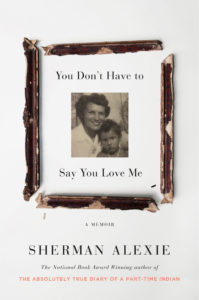 You Don’t Have to Say You Love Me
You Don’t Have to Say You Love Me
by Sherman Alexie
An Amazon Best Book of June 2017: Sherman Alexie’s memoir, You Don’t Have to Say You Love Me, is an extraordinary look at the complicated relationship between a remarkable mother and an equally remarkable son, set, mostly, in the Spokane Indian Reservation where Alexie spent his childhood. His whip-smart, sometimes cruel mother saved the family when she stopped drinking, but was inexplicably tough on her kids – something Alexie traces back to mental illness, sexual assault, and the Indian experience of violence and oppression. Family memoirs often seem like an opportunity for score settling, but Alexie is so aware of his own fallible memory and his own imperfections that this one won’t make you bristle. His style is idiosyncratic – passages of verse lead to passages of prose — but it’s readable, unpretentious, funny and deeply compassionate. –Sarah Harrison Smith, The Amazon Book Review
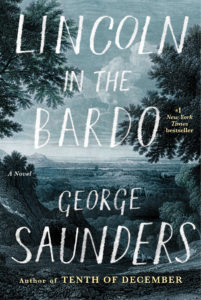 Lincoln in the Bardo
Lincoln in the Bardo
George Saunders
An Amazon Best Book of February 2017: Lincoln in the Bardo is hilariously funny, horribly sad, and utterly surprising. If you can fight past an initial uncertainty about the identity of its narrators, you may find that it’s the best thing you’ve read in years. This first novel by acclaimed short-story-writer and essayist George Saunders (Tenth of December, The Brain-Dead Megaphone) will upend your expectations of what a novel should be. Saunders has said that “Lincoln in the Bardo” began as a play, and that sense of a drama gradually revealing itself through disparate voices remains in the work’s final form.
The year is 1862. President Lincoln, already tormented by the knowledge that he’s responsible for the deaths of thousands of young men on the battlefields of the Civil War, loses his beloved eleven-year-old son, Willie, to typhoid. The plot begins after Willie is laid to rest in a cemetery near the White House, where, invisible to the living, ghosts linger, unwilling to relinquish this world for the next. Their bantering conversation, much of it concerned with earthly — and earthy – pleasures, counterbalances Lincoln’s abject sorrow.
Saunders takes huge risks in this novel, and they pay off. His writing is virtuosic – and best of all, its highs and lows are profoundly entertaining. You may hear echoes of Thornton Wilder, Beckett and even a little Chaucer, but Lincoln in the Bardo is peculiar and perfect unto itself. Some advice: don’t try to read this one in a library. You’ll be hooting with laughter when you aren’t wiping away your tears. –Sarah Harrison Smith, The Amazon Book Review
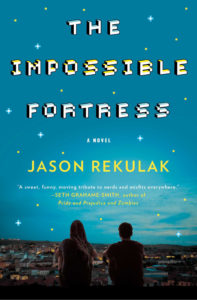 The Impossible Fortress
The Impossible Fortress
by Jason Rekulak
An Amazon Best Book of February 2017: The Impossible Fortress is one of those books—one of those rare and special few where, once you have finished it, you want all your friends to read it immediately. This is especially true if you grew up in the 1980s, because The Impossible Fortress is a coming-of-age story tucked inside a love letter to that strange and wonderful decade. The novel is set in 1987 when computer games had only recently entered our homes, Jolt cola (the predecessor of modern energy drinks) was still a thing, and Playboy magazine had countless 14-year-old boys across the country trying to get their hands on a copy of the Vanna White (of Wheel of Fortune fame) issue. Billy Martin and his two best friends are three such boys, and their pursuit of the epic magazine leads them to the local office supply store, computer whiz Mary Zelinsky, and a hero’s quest to save a princess. Author Jason Rekulak’s ability to conjure powerful adolescent feelings of friendship, first love, and that difficult place where the two collide, is impressive. Laughter comes from page after page, and some clever surprises too—all of it with a 1980s mixed tape running in the background. –Seira Wilson, The Amazon Book Review
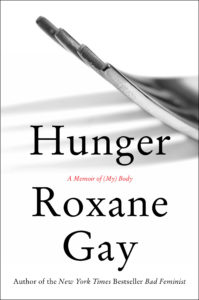 Hunger
Hunger
by Roxanne Gay
An Amazon Best Book of June 2017: If you’re a woman in America, chances are, no matter your size, you probably have a somewhat fetishistic relationship with food. We obsess over having too much, too little (to a lesser degree); we use terms like stealing a bite and guilty pleasure–things that evoke shame, and are meant to keep our bodies in line. For those that fit that (ever narrowing) bill, congratulations! Clothes are designed to fit you, kale growers love you, and so does society. You bask in its glow. The rest risk being in shadow, which is exactly where Roxane Gay wanted to be. In her brutally honest and brave memoir Hunger, Gay recounts a childhood sexual assault that led her to purposely gain weight in order to be unseen and therefore “safe.” Gay warns at the beginning of the book that if you’re looking for a triumphant weight loss memoir, this is not it. But Hunger is a triumph nonetheless. It’s a story not easily told, but the telling set her free. And through Gay’s experience we learn one of lessons she eventually did, that “all of us have to be more considerate of the realities of the bodies of others,” and more accepting of our own. –Erin Kodicek, The Amazon Book Review
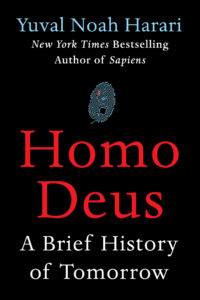 Homo Deus: A Brief History of Tomorrow
Homo Deus: A Brief History of Tomorrow
By Yuval Noah Harari
An Amazon Best Book of February 2017: Those who read and loved Yuval Noah Harari’s Sapiens have been eagerly anticipating his new book Homo Deus. While Sapiens looked back at our evolutionary development, this new book examines where we might be headed (Homo Deus is subtitled “A Brief History of Tomorrow”). Predicting the future isn’t as easy as deconstructing the past, and Harari openly admits the challenge—but even if he’s completely wrong in his predictions, and most of us doubt he is, Homo Deus is the kind of provocative, food-for-thought read that drew so many of us to his work in the first place. According to Harari, our future could be very different from our present—dark, technocratic, and automated—but reading about our possible fates, presented in Harari’s clear-eyed and illuminating style, sure is fascinating. –Chris Schluep, The Amazon Book Review
Also Recommended by Bill Gates
BEST BOOKS INDEX CATEGORIES: THE BEST BOOKS OF 2017 COLLECTION, BILL GATES’ BOOK RECOMMENDATIONS
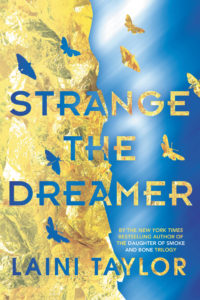 Strange the Dreamer
Strange the Dreamer
by Laini Taylor
Book Description
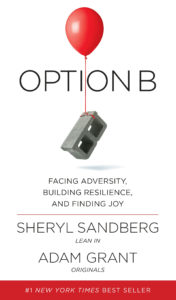 Option B
Option B
by Sheryl Sandberg
An Amazon Best Book of April 2017: After the unexpected passing of her beloved husband, Facebook COO and bestselling author of Lean In, Sheryl Sandberg, feared that she and her children would never find joy again. Fortunately this fear was unfounded. Option B: Facing Adversity, Building Resilience, and Finding Joy–co-authored with psychologist and friend Adam Grant–shows you how Sandberg, and many others who have overcome a wide range of profound hardships, triumphed over tragedy. The book posits that it’s helpful to think of resilience like a muscle, one that atrophies in the calm between the storms of our lives. But there are things we can do to develop it, so we’re better prepared when adversity strikes. In America, culture can put a kink in this plan. Processing a painful event can be hindered when you’re wired not to talk about it. We all know that when someone asks how we’re doing, the expected response is “fine,” no matter if we’ve just lost a limb, or had a cancer scare. We will grin, and we will bear it, and we will go back to work too soon and burst into tears in the copy room when confronted by a malevolent stapler (or maybe that’s just me). Recently, Sandberg helped to enact a new employee benefit at Facebook: 20 days of paid bereavement leave, twice the amount that was offered previously. As she explains in Option B, it’s the humane thing to do, and it also makes good business sense; compassionate companies engender more loyal employees. In this way, Option B is more than a little revolutionary. It challenges us to change systems that don’t always take our humanness into account. And that’s something we need to do on a personal level as well. None of us are immune to misfortune and heartbreak. We need to cut ourselves some slack when times get tough, and, as Sandberg discovered, flip the golden rule: When a loved one is in distress, instead of treating them how you would want to be treated, consider how they want to be treated, which may be quite different. Option B starts an (oftentimes) uncomfortable but important conversation. If we lean in to the numerous lessons it has on offer, there’s a lot more joy to be found. –Erin Kodicek, The Amazon Book Review
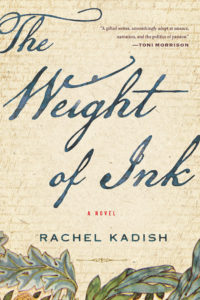 The Weight of Ink
The Weight of Ink
by Rachel Kadish
An Amazon Best Book of June 2017: I often have trouble staying engaged by literary novels starring characters separated by centuries. But The Weight of Ink hooked me so deeply that at no point did I want to wiggle free of this story of two historians investigating 300-year-old letters written in plague-ridden London by a young Jewish woman with a white-hot intellect and no acceptable outlet for it. British history professor Helen Watt immediately recognizes the historical value of a bundle of rabbi’s letters and books discovered behind the wall of an old house, and she recruits American graduate student Aaron Levy to help her with translations. Months from retirement, Helen hides her Parkinson’s disease, while Aaron struggles with his Shakespeare-focused thesis that’s going nowhere fast and with Helen’s curmudgeonly ways. But when Helen and Aaron realize that the rabbi’s letters were penned for him by a woman, not the typical male scribe, their historical significance skyrockets. As Helen and Aaron’s investigation accelerates, author Rachel Kadish plunges the reader into the smoggy, socially circumscribed world of Ester Velasquez in 17th-century London. A Jewish woman living in a community that doesn’t support thinking in females or speculation beyond the accepted dogma, Ester has survived much tragedy in her young life and now quietly but steadfastly refuses to be squashed further. As plague stalks London, Ester finds ways to let her intellectual passion free despite pressures to marry and be domesticated in mind and soul. Gorgeous writing that might, in isolation of the story, risk coming off as overwrought instead perfectly renders the strong emotions that run through Ester, Helen, and Aaron as they face down opponents and seize opportunities. Kadish, with storytelling genius, mirrors events and eureka moments across the centuries, binding the characters to one another. And an enormously satisfying ending wraps everything up while leaving enough rough edges to mimic the loose ends of real life. –Adrian Liang, The Amazon Book Review
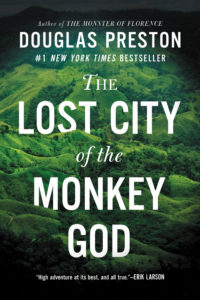 The Lost City of the Monkey God: A True Story
The Lost City of the Monkey God: A True Story
by Douglas Preston
An Amazon Best Book of January 2017: In 2012, author Douglas Preston joined a team of explorers searching for Ciudad Blanca (“The White City”), a legendary ruin hidden in the dense jungle of eastern Honduras. To this point the city – also known as “the Lost City of the Monkey God” – was literally a legend; while various hucksters and hoaxers had claimed to have discovered the abandoned metropolis, no credible evidence had ever been presented, and its very existence remained shrouded in doubt. In addition to the objective hazards of tropical disease, wild boars, and the deadly fer-de-lance viper, locals stoked the mystique, describing various curses awaiting would-be discoverers. Don’t pick the flowers, or you’ll die.
But this team had an advantage that previous searchers had lacked: LIDAR, an advanced laser-imaging technology able to penetrate the dense jungle canopy – just enough – and return detailed elevation profiles from which subtle, man-made anomalies could be identified. Almost immediately, two major sites emerged, their scale and architecture indicating a civilization to rival another local, more famous power, the Maya.
The announcement had consequences. The fledgling Honduran government, having gained power through a military coup, sought to use the discovery to bolster its status with the population, while the academic community ripped the expedition with accusations of Indiana Jones-style exploitation and shoddy scientific methods, cries which could be uncharitably interpreted as sour grapes. Encroaching deforestation and the prospect of looters created urgency to conduct a ground survey, and the team ventured into the wilderness and all the hazards that awaited, including an unexpected and insidious danger that cursed the team well beyond their return home.
The author of over 30 books, including number of bestselling thrillers co-written with Lincoln Child, Preston knows pace, and he packs several narratives into a taut 300 pages. Indiana Jones criticism aside, the story of the discovery and exploration of the ruin is solid adventure writing, and he walks a fine line in dealing with the archaeology community’s response, reporting on the bases for their criticism where they chose to provide it. And by invoking Jared Diamond’s Guns, Germs, and Steel, Preston speculates on the mysterious, sudden demise of the White City and its inhabitants, drawing ominous parallels between their fate and possibly our own. Lost City is a tale that manages to be both fun and harrowing, a vicarious thrill worthy of a place on the shelf next to David Grann’s The Lost City of Z. –Jon Foro, The Amazon Book Review
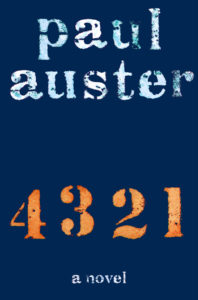 4 3 2 1
4 3 2 1
by Paul Auster
An Amazon Best Book of February 2017: Paul Auster’s 4321 is his first novel in seven years, and it feels extra personal. Details of a life spent growing up in Brooklyn—of loving the Brooklyn Dodgers, Laurel and Hardy, summer camp—are laid out with the earnest intensity of a writer looking back on his life. Plot points arise—for instance, a person is killed by lightning—which mimic more unique moments from Auster’s own life experience. At nearly 900 pages, it is also a long novel—but a reason for that is 4321 tells the story of its protagonist, Archie Ferguson, four different times. What remains consistent throughout Archie’s life (or lives) is that his father starts out with the same career, Archie falls in love with the same girl, and his personality seems more nature than nurture. But those are starting off points, and if our lives are the sum of our choices, they are the sum of other people’s choices as well. Circumstances matter, and what will keep you thinking about this book is the convergence of time and circumstance within each of Archie’s different lives. His past propels him, his circumstances form him, and regardless of which life we are reading, time will ultimately take him. –Chris Schluep, The Amazon Book Review
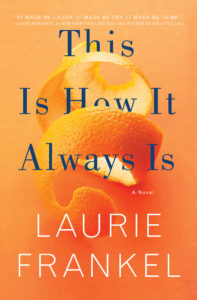 This Is How It Always Is
This Is How It Always Is
by Laurie Frankel
An Amazon Best Book of January 2017: In recent years we’ve seen an increasing number of memoirs from transgender individuals and from parents forging uncharted waters in order to help their transgender children live happy, healthy lives in a society that still largely defines gender by what’s in your pants. In her novel This is How It Always Is Laurie Frankel takes those real-life experiences and puts them into a big-hearted story of family and secrets. Penn and Rosie are a close, loving couple, living in Madison, Wisconsin with their five boys. But it becomes evident before long that their youngest, Claude, feels like he should have been born a girl. So how do these strong, supportive parents go about helping their son live as the person he wants to be? It’s a fascinating thing to behold. The nuances and unforeseen pitfalls of trying to protect your child from fear and hate while nurturing a sense of acceptance is daunting. What is private and what is a secret, and what is, really, nobody’s business? Sometimes secrets have a way of materializing in the blink of an eye or the span of an innocuous question, and this novel is about the lengths we will go, as parents and siblings, to protect each other. And how we react when our secrets are exposed. This is How It Always Is in an incredible read that speaks to the heart of what it means to love and be loved by family. –Seira Wilson, The Amazon Book Review
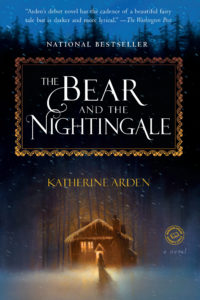 The Bear and the Nightingale (Winternight Trilogy)
The Bear and the Nightingale (Winternight Trilogy)
by Katherine Arden
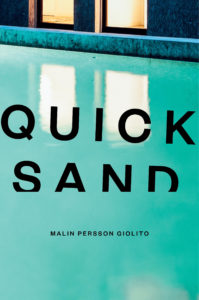 Quicksand
Quicksand
by Malin Persson Giolito
Book Description
Named the Best Swedish Crime Novel of the Year by the Swedish Crime Writers Academy
QUICKSAND is an incisive courtroom thriller and a drama that raises questions about the nature of love, the disastrous side effects of guilt, and the function of justice.
A mass shooting has taken place at a prep school in Stockholm’s wealthiest suburb. Maja Norberg is eighteen years old and on trial for her involvement in the massacre where her boyfriend and best friend were killed. When the novel opens, Maja has spent nine excruciating months in jail awaiting trial. Now the time has come for her to enter the courtroom. But how did Maja, the good girl next door who was popular and excelled at school, become the most hated teenager in the country? What did Maja do? Or is it what she didn’t do that brought her here?
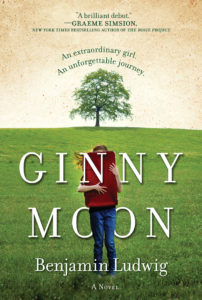 Ginny Moon
Ginny Moon
by Benjamin Ludwig
An Amazon Best Book of May 2017: It’s the rare novel that has an autistic teenage heroine, and an even rarer novel is one that surprises you on every single page, as Ginny Moon quite emphatically does. Told from the point of view of thirteen-year-old Ginny, this absorbing debut sets at its heart Ginny’s obsession with “Baby Doll,” whom she unwillingly abandoned four years ago when she was taken away from her drug-addicted and abusive birth mother. Ginny fears Baby Doll is still in a suitcase, where she left her when the police separated Ginny from her mother, and Ginny has been testing and breaking the patience of various foster parents in her attempts to reunite with her mother so that Ginny can again take care of Baby Doll. Ginny is not stupid—she finds her birth mother on Facebook, steals another student’s phone to contact her, and concocts various plans to get back to her Baby Doll with a single-mindedness that is as daring as it is alarming, for Ginny is fully aware that her birth mother will likely again physically abuse her. Ginny’s unpredictability keeps the pressure high, and I wondered throughout how this novel could possibly deliver a satisfying conclusion. But Benjamin Ludwig, himself the foster parent of an autistic teen, pulls together the action into a tear-provoking finale that will have you cheering for the stubborn, brave, impulsive, and ultimately heroic Ginny Moon. (Heck, I’m getting teary just writing this review.) —Adrian Liang, The Amazon Book Review
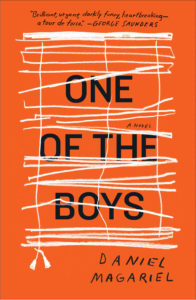 One of the Boys
One of the Boys
by Daniel Magariel
An Amazon Best Book of March 2017: One of the Boys is an intense, immersive, debut novel that is a shining example of precision storytelling. A 12-year-old boy and his older brother are forced to take sides in their parents’ bitter divorce, and what follows is both unexpected and heartbreaking. Convinced that their mother was the villain of their family story, a frightening truth starts to show through the cracks as they begin a new life with their father. As their father spirals into addiction, the narration of a young boy’s confusion and increasing fear offers powerful insight into an experience most of us can’t begin to imagine. The strength the brothers give each other is a testimony to their bond and how they will find a way out of the increasing violence and irrational behavior that pulls at them like quicksand. Author Daniel Magariel tells a harrowing story of guilt and betrayal tempered by flashes of absurdity and grace that left me deeply grateful for the journey. –Seira Wilson, The Amazon Book Review
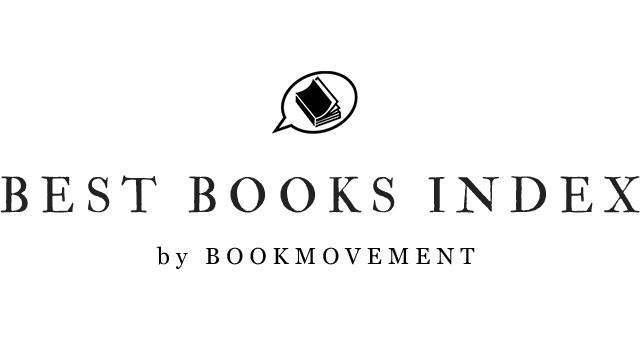
Leave a Reply